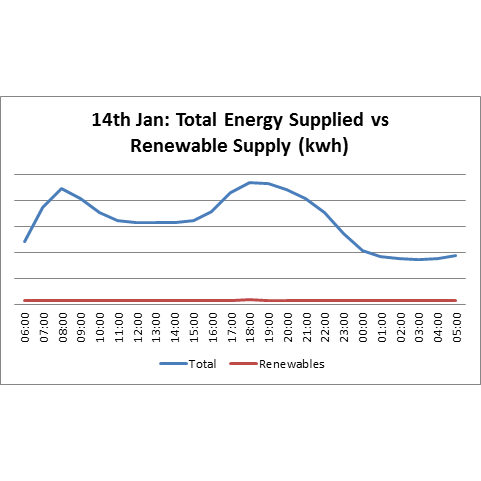After the cold weekend

On Friday I wrote a blog about the cold weather we were expecting for the weekend, and the preparations we had taken. It was certainly a cold one, and busy for our operational teams, led by my executive colleague Andrew Hopkins and his Operations Directorate. It was our busiest Saturday for five years, and we dealt with more than 700 jobs right across the patch on Saturday alone.
The next few days are now anticipated to be frosty and cold, but nothing out of the ordinary. So for us, our workload should return to the normal levels we expect for this time of year. I mentioned at the end of my previous blog that the weekend would demonstrate the importance of gas for heating and powering homes, and that really was the case.
The table below is a quick chart my Systems Operation Team put together on the day of peak demand at the end of last week. Blue is the overall energy demand – primarily met by gas for heating and electricity generating, while red is energy generated by renewable sources. Our network brought energy – in the form of gas for heating and cooking, to the vast majority of homes in Wales and the south west.

The chart makes it absolutely clear any future without gas would be cold, and considering that at the moment (Tuesday afternoon) gas turbines are generating more than 40% of the 48GW we are consuming in the UK (as compared to 0.31% of wind energy) it would probably be dark too.
So all I can do is reiterate how I ended my previous blog. Decarbonisation of energy and heating of homes is whatever your views on climate change, a good idea. But security of supply and value for money is essential and cannot be sacrificed. Like it or not, the brutal truth is that without gas to pick up the demand to heat homes and for energy, an energy future made up of renewables alone would have resulted in lights and radiators going off.
As a business, we’re looking forward to facing the challenges of the future. We’re working hard on reducing gas’s impact on the environment – ranging from connecting new biomethane producers and working with other gas distribution networks on studying what different mixes of gas we could distribute, to working our way through a 30 year pipe replacement programme, which will reduce gas leaks and the accompanying environmental impact.
As this weekend demonstrates, gas should be an essential component in a low carbon, value for money energy market - and continue to be a key feature of future energy policy.



